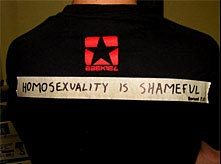Free Speech for All
 Last Friday, a federal judge was asked to decide whether Poway High School administrators acted properly when they pulled a student from class for wearing an anti-gay slogan on his T-shirt back in 2004.
Last Friday, a federal judge was asked to decide whether Poway High School administrators acted properly when they pulled a student from class for wearing an anti-gay slogan on his T-shirt back in 2004. As much disgust as I feel for Tyler Chase Harper, the high school student who was disciplined for wearing a “Homosexuality is Shameful” T-shirt, I feel that he has a constitutional right to put whatever hateful message that he wants on his clothing. It is not for school administrators to determine what messages are suitable and which aren’t. Rather than engaging in censorship, administrators at Poway High School outside of San Diego, California, should have simply let Harper face the consequences of promoting a message of hate and intolerance. Offensive speech is still protected speech. In the end, my reluctance to support legal consequences for offensive speech arises in part from my confidence that the social consequences of espousing such backward views will be much more onerous to bear for bigots like Harper.
Harper wore the shirt in response to a “Day of Silence” organized by the School’s Gay-Straight Alliance to raise awareness of GLBT issues. He was issued a dress-code violation, but not suspended. Predictably, local evangelicals sued, and in a 2-1 decision, the U.S. 9th Circuit Court of Appeals held that a T-shirt proclaiming “Be ashamed, our school embraced what God has condemned” on the front and “Homosexuality is shameful” on the back was “injurious to gay and lesbian students and interfered with their right to learn.” Wearing such a T-shirt can be barred on a public high school campus without violating the First Amendment, the Court ruled.
While I sympathize with the desire of school officials to protect students from harassment, they must balance that desire with the constitutional right to free speech. This is not an easy task. However, the Culture Wars are not going away any time soon. I would argue that school officials could have used Harper’s offensive T-shirt as a valuable opportunity to engage queer students in a dialogue about bigotry, intolerance, and the hurdles they will face in their struggle to achieve dignity and equality as adults. And while the law can and must often be used to protect the rights of GLBT people, I don’t feel that school officials should have put their stamp of approval on censorship as an appropriate tool.
Besides, if I were a queer student at Poway High School, I’d have worn a T-shirt that read “Bigots Suck.”












13 Comments:
However, slogans and messages of all kinds are being attacked by school officials not only because they may be offensive to certain groups within the school, but also because they sense that all the graphics and verbiage are a huge distraction in the classroom.
Freedom of speech is not absolute. The right to say what/when you want must always be balanced against other legitimate and competing interests, in this case the right of GLBT students to be educated in an environment free from harassment. Tyler Chase Harper should take his message to the streets, not the classroom. I believe your premise presents somewhat of a slippery slope. Should laws prohibiting discrimination in the areas of housing and employment be invalidated on the basis that they infringe upon a person’s right of free association?
L-
let's stick to the topic of free speech, OK? my post was not about freedom of association and whether or not it's inviolable. i don't really find it a useful parallel to this discussion.
i don't know that a T-shirt qualifies as harrassment. also, there are precedents that have established offensive speech as being protected under the first amendment. moreover, i think most would agree that the slippery slope argument can best be made about censorship, not about civil liberties.
i don't think censorship is the answer here. anyone else want to weigh in on this?
Freedom of speech and freedom of association both derive from the First Amendment. I agree that that the First Amendment protects hateful speech, but not in all cases. Finally, relevant to harassment, what matters is not the T-shirt itself, but its content and the message such content conveys.
"Freedom of speech and freedom of association both derive from the First Amendment."
agreed. but they are not the same, and i was talking about the former, not the latter.
"Finally, relevant to harassment, what matters is not the T-shirt itself, but its content and the message such content conveys."
hmmm... i thought it was obvious that when i questioned whether or not a T-shirt qualified as harrassment, i was speaking about its content and its message. blank T-shirts are rarely offensive.
Insofar as the First Amendment protects a bundle of rights that are interrelated, why do you feel that the distinction between freedom of speech and association is so important here? Why should this kid have the right to badger GLBT students in a public school funded by taxpayer money? Aren’t there more appropriate forums where his “Constitutional rights” can be exercised? Should T-shirts with racial epithets be allowed in public schools?
dean,
The legal reality is however that teens are not considered full citizens, and are under the purview of their parents and schools. As such the full rights to freedom of speech actually do not apply to high schools. I learned this long ago in a completely unrelated matter at my highschool--that was a while ago. Given that, however, I agree that free exercise rather than censorship are the better way to go.
L-
i don't imagine that freedom of association was at stake in this case. in any event, you feel it's relevant to this discussion; i don't.
what would be a far more interesting and appropriate parallel would be the issue of sexual harrassment in the workplace and how barring offensive speech in that context (i.e. the workplace) limits freedom of speech.
however, since you weren't clever enough to make that connection on your own and seem to be fixating on freedom of association, i'm not going to tell you my thoughts on workplace rules vs. free speech :)
Sandouri Dean Bay:
Please forgive me if I am not as clever as you.
That being said, the intent behind my original post was to illustrate that there is a connection between the right to free speech and the right of association. I think that it is perfectly legitimate to explore the nexus between those two concepts. If Tyler Harper has the right to lash out against gay kids in school, why should the law punish him for refusing to hire those same kids in an employment setting? Neither the right to free speech nor association is unfettered.
I will reserve comment on the issue of workplace harassment as well.
oh, you're plenty clever, L.
but it's sandouri dean bey, not bay.
and i agree that it is perfectly legitimate to explore the nexus between the freedom of speech and the freedom of association, just as i agree that neither is unfettered. but that wasn't the point of my post. in relation to this particular case, i simply don't think the latter is relevant.
christopher-
i agree that the high school environment presents something of a special case, one in which judges have ruled that full free speech rights do not apply. for that reason, the decision of the federal judges that upheld the disciplinary action taken against harper is not surprising.
i would not want to see glbt high schoolers subjected to intolerance, harrassment or hate speech. i would tend to take a much harder line when it comes to actual bullying or more intense abuse directed at a particular person (as is often the case). and it sounds like you agree that the real slippery slope here is the one on which we tread when we engage in censorship, even when our intentions are good.
thanks for your comments, boys!
This is why uniforms are best. Frankly, you have no true rights until you are an adult. High school is a controlled environment and should continue to be.
I thought a few folks would be interested in reading the court's actual ruling (as it addresses some of the comments posted here).
Here's the link (if you cut and paste this into your browser, it will hopefully work):
http://www.ca9.uscourts.gov/ca9/newopinions.nsf/D2D4CBF690CD61A6882571560001FEBD/$file/0457037.pdf?openelement
Thank you to Anonymous for this link. I’ve read through it (quite fascinating), and it should be noted that Harper made five claims, none of which involved freedom of assembly.
Here are a couple of highlights from the actual decision:
The courts have construed the First Amendment as applied to public schools in a manner that attempts to strike a balance between the free speech rights of students and the special need to maintain a safe, secure and effective learning environment.
The Supreme Court has declared that “the First Amendment rights of students in public schools are not automatically coextensive with the rights of adults in other settings, and must be applied in light of the special characteristics of the school environment.”
In Tinker and Bethel Sch. Dist. v. Fraser, 478 U.S. 675 (1986), the Supreme Court confirmed a student’s right to free speech in public schools.16 In balancing that right against the state interest in maintaining an ordered and effective public education system, however, the Court declared that a student’s speech rights could be curtailed under two circumstances. First, a school may regulate student speech that would “impinge upon the rights of other students.” Second, a school may prohibit student speech that would result in “substantial disruption of or material interference with school activities.”
…
I’d like to add that while I agree with the substance of the Tinker decision (perhaps more than my post let on), I myself would err on the side of free expression rather than censorship. However, I do understand and respect the need to prevent disruption and harassment. Admittedly, it’s a tricky issue.
Thank you again to all who participated in this very interesting dialogue (especially L).
Post a Comment
<< Home